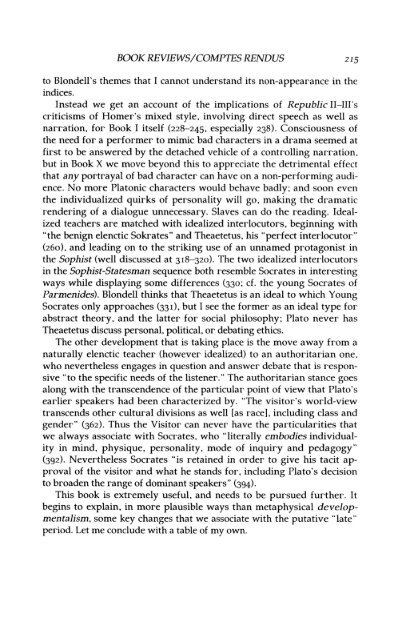OUSEION - Memorial University's Digital Archives Initiative ...
OUSEION - Memorial University's Digital Archives Initiative ...
OUSEION - Memorial University's Digital Archives Initiative ...
Create successful ePaper yourself
Turn your PDF publications into a flip-book with our unique Google optimized e-Paper software.
BOOK REVIEWS/COMPTES RENDUS 2I5<br />
to Blondell's themes that I cannot understand its non-appearance in the<br />
indices.<br />
Instead we get an account of the implications of Republic II-Ill's<br />
criticisms of Horner's mixed style, involving direct speech as well as<br />
narration. for Book I itself (228-245. especially 238). Consciousness of<br />
the need for a performer to mimic bad characters in a drama seemed at<br />
first to be answered by the detached vehicle of a controlling narration.<br />
but in Book X we move beyond this to appreciate the detrimental effect<br />
that any portrayal of bad character can have on a non-performing audience.<br />
No more Platonic characters would behave badly: and soon even<br />
the individualized quirks of personality will go. making the dramatic<br />
rendering of a dialogue unnecessary. Slaves can do the reading. Idealized<br />
teachers are matched with idealized interlocutors, beginning with<br />
"the benign elenctic Sokrates" and Theaetetus. his "perfect interlocutor"<br />
(260), and leading on to the striking use of an unnamed protagonist in<br />
the Sophist (well discussed at 3 r8-32o). The two idealized interlocutors<br />
in the Sophist-Statesman sequence both resemble Socrates in interesting<br />
ways while displaying some differences (330: d. the young Socrates of<br />
Parmenides). Blondell thinks that Theaetetus is an ideal to which Young<br />
Socrates only approaches (331). but I see the former as an ideal type for<br />
abstract theory. and the latter for social philosophy: Plato never has<br />
Theaetetus discuss personal, political, or debating ethics.<br />
The other development that is taking place is the move away from a<br />
naturally elenctic teacher (however idealized) to an authoritarian one.<br />
who nevertheless engages in question and answer debate that is responsive<br />
"to the specific needs of the listener." The authoritarian stance goes<br />
along with the transcendence of the particular point of view that Plato's<br />
earlier speakers had been characterized by. "The visitor's world-view<br />
transcends other cultural divisions as well [as racel. including class and<br />
gender" (362). Thus the Visitor can never have the particularities that<br />
we always associate with Socrates. who "literally embodies individuality<br />
in mind. physique, personality, mode of inquiry and pedagogy"<br />
(392). Nevertheless Socrates "is retained in order to give his tacit approval<br />
of the visitor and what he stands for. including Plato's decision<br />
to broaden the range of dominant speakers" (394).<br />
This book is extremely usefuL and needs to be pursued further. It<br />
begins to explain, in more plausible ways than metaphysical deve1opmentalism.<br />
some key changes that we associate with the putative "late"<br />
period. Let me conclude with a table of my own.

















